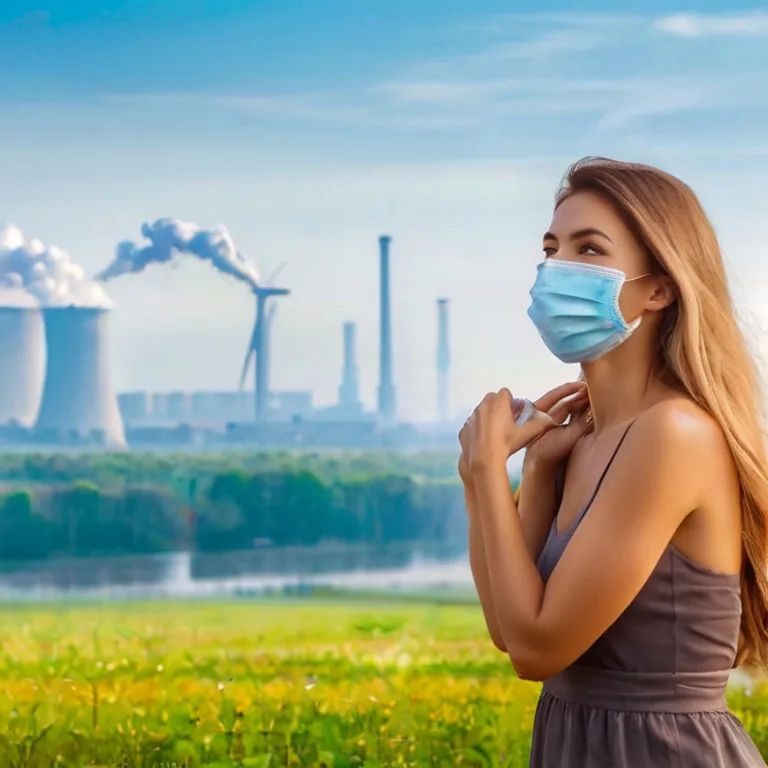Explore The impact of pollution on skin health and discover practical tips to safeguard your skin against its harmful impact. Learn about the latest research findings and skincare solutions to maintain a radiant and healthy complexion amidst environmental challenges.
Table of Contents
Introduction:
In an increasingly industrialized world, pollution has become a significant concern not only for environmentalists but also for dermatologists and skincare experts. The detrimental effects of pollution on human health are widely acknowledged, but its impact on skin health often goes unnoticed. This article explores the various ways in which pollution affects our skin and the measures we can take to mitigate its harmful effects.
Understanding Pollution and Its Sources:
Pollution refers to the presence of harmful substances in the environment, which can include air pollution from vehicle emissions, industrial pollutants, particulate matter, and chemicals released into the atmosphere. Other sources of pollution include water contamination, noise pollution, and light pollution. Among these, air pollution is one of the most prevalent and concerning forms, with major contributors being vehicle exhaust, industrial emissions, and the burning of fossil fuels.
Read about Top Essential Summer Skincare Tips click here
The Impact of Pollution on Skin Health:
Pollution poses a myriad of threats to skin health, primarily through oxidative stress and inflammation. The skin serves as the body’s first line of defense against external aggressors, including pollutants. However, prolonged exposure to pollution can overwhelm the skin’s natural defense mechanisms, leading to various dermatological issues.
- Premature Aging:
One of the most visible effects of pollution on the skin is premature aging. Airborne pollutants such as fine particulate matter (PM2.5) and polycyclic aromatic hydrocarbons (PAHs) can penetrate the skin’s barrier and generate free radicals. These free radicals accelerate the breakdown of collagen and elastin, leading to wrinkles, fine lines, and sagging skin.
- Skin Discoloration:
Pollution can also contribute to skin discoloration and uneven pigmentation. Exposure to pollutants triggers the production of melanin, resulting in dark spots, hyperpigmentation, and an overall dull complexion. This can be particularly problematic for individuals with sensitive or reactive skin.
- Acne and Breakouts:
Pollutants such as sulfur dioxide and nitrogen dioxide can clog pores and exacerbate acne and breakouts. These pollutants, combined with dirt and sweat, create a breeding ground for bacteria, leading to inflammation and blemishes.
- Skin Sensitivity:
Pollution can compromise the skin’s natural barrier function, making it more susceptible to irritation and sensitivity. This can manifest as redness, itching, and discomfort, especially for individuals with pre-existing skin conditions such as eczema or rosacea.
- Exacerbation of Skin Conditions:
For those already suffering from skin conditions like eczema, psoriasis, or dermatitis, pollution can exacerbate symptoms and trigger flare-ups. The inflammatory nature of pollutants can intensify itching, redness, and discomfort associated with these conditions, making management more challenging.
Mitigating the Effects of Pollution on Skin:
Mitigating the effects of pollution on skin health requires a proactive approach that involves both skincare practices and lifestyle modifications. Here are several strategies to help protect your skin from the harmful effects of pollution:
- Cleanse Regularly:
Cleansing your skin thoroughly is crucial for removing pollutants, dirt, and impurities that accumulate throughout the day. Use a gentle cleanser morning and night to wash away debris and prevent pore congestion. Consider double cleansing in the evening to ensure thorough removal of makeup, sunscreen, and environmental pollutants.
- Use Antioxidants:
Incorporate antioxidant-rich skincare products into your daily routine to combat oxidative stress caused by pollution. Antioxidants such as vitamin C, vitamin E, green tea extract, and resveratrol help neutralize free radicals and protect the skin from environmental damage. Look for serums, moisturizers, and treatments containing these powerful antioxidants for added protection.
- Apply Sunscreen Daily:
Sunscreen is essential not only for protecting against harmful UV rays but also for creating a barrier against environmental pollutants. Choose a broad-spectrum sunscreen with SPF 30 or higher and apply it generously to all exposed areas of skin, including the face, neck, and hands. Reapply sunscreen every two hours, especially when spending extended periods outdoors.
- Invest in Antipollution Skincare:
Consider incorporating skincare products specifically formulated to shield the skin from pollution. Look for ingredients like moringa extract, activated charcoal, niacinamide, and pollution-fighting peptides, which help purify, detoxify, and protect the skin from environmental stressors. These products can help strengthen the skin’s natural barrier and minimize the penetration of pollutants.
- Hydrate and Moisturize:
Proper hydration is essential for maintaining healthy skin and strengthening its natural defenses against pollution. Use a hydrating moisturizer containing ingredients like hyaluronic acid, glycerin, and ceramides to replenish moisture levels and prevent transepidermal water loss. Apply moisturizer both morning and night to keep the skin hydrated and supple.
- Protective Clothing and Accessories:
Whenever possible, cover exposed areas of skin with protective clothing, hats, and sunglasses to minimize direct exposure to pollution. Consider wearing lightweight, long-sleeved shirts, pants, and wide-brimmed hats made from breathable fabrics like cotton or linen. Sunglasses with UV protection help shield the delicate skin around the eyes from UV radiation and environmental aggressors.
- Avoid Peak Pollution Times:
Be mindful of outdoor activities during times of high pollution, such as rush hour traffic or days with poor air quality. Check local air quality indexes and plan outdoor activities accordingly. If air pollution levels are elevated, consider limiting outdoor exposure or engaging in indoor activities instead.
- Maintain a Healthy Lifestyle:
Adopting a healthy lifestyle can support overall skin health and resilience against environmental pollutants. Eat a balanced diet rich in antioxidants, vitamins, and minerals to nourish your skin from the inside out. Stay hydrated by drinking plenty of water throughout the day, and prioritize regular exercise to promote circulation and detoxification.
- Create a Barrier:
Consider using a physical barrier, such as a lightweight scarf or pollution mask, to shield your face from airborne pollutants when outdoors in heavily polluted areas. These barriers can help filter out harmful particles and reduce direct contact with pollution, minimizing the risk of skin irritation and inflammation.
By incorporating these skincare practices and lifestyle modifications into your daily routine, you can help mitigate the effects of pollution on your skin and maintain a healthy, radiant complexion for years to come.
Conclusion:
In conclusion, pollution poses a significant threat to skin health, contributing to premature aging, skin discoloration, acne, sensitivity, and exacerbation of existing skin conditions. As urbanization and industrialization continue to escalate, it is more important than ever to prioritize skincare practices that help defend against environmental pollutants. By adopting a comprehensive skincare routine and investing in protective measures, individuals can minimize the adverse effects of pollution and maintain healthy, radiant skin for years to come.
For more information click here

